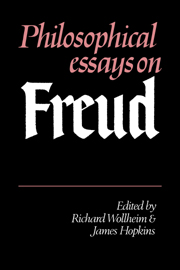Book contents
- Frontmatter
- Contents
- Introduction: philosophy and psychoanalysis
- 1 Conversations on Freud; excerpt from 1932–3 lectures
- 2 Freud, Kepler, and the clinical evidence
- 3 Critical empiricism criticized: the case of Freud
- 4 Freudian commonsense
- 5 Disposition and memory
- 6 On Freud's doctrine of emotions
- 7 The id and the thinking process
- 8 The bodily ego
- 9 Norms and the normal
- 10 On the generation and classification of defence mechanisms
- 11 Models of repression
- 12 Mauvaise foi and the unconscious
- 13 Self-deception and the ‘splitting of the ego’
- 14 Freud's anthropomorphism
- 15 Freud's anatomies of the self
- 16 Motivated irrationality, Freudian theory and cognitive dissonance
- 17 Paradoxes of irrationality
- Works of Freud cited
- Select bibliography
16 - Motivated irrationality, Freudian theory and cognitive dissonance
Published online by Cambridge University Press: 01 October 2009
- Frontmatter
- Contents
- Introduction: philosophy and psychoanalysis
- 1 Conversations on Freud; excerpt from 1932–3 lectures
- 2 Freud, Kepler, and the clinical evidence
- 3 Critical empiricism criticized: the case of Freud
- 4 Freudian commonsense
- 5 Disposition and memory
- 6 On Freud's doctrine of emotions
- 7 The id and the thinking process
- 8 The bodily ego
- 9 Norms and the normal
- 10 On the generation and classification of defence mechanisms
- 11 Models of repression
- 12 Mauvaise foi and the unconscious
- 13 Self-deception and the ‘splitting of the ego’
- 14 Freud's anthropomorphism
- 15 Freud's anatomies of the self
- 16 Motivated irrationality, Freudian theory and cognitive dissonance
- 17 Paradoxes of irrationality
- Works of Freud cited
- Select bibliography
Summary
Freudian theory and the philosophical problem
The kind of motivated irrationality that has attracted most attention from philosophers has been irrationality exhibited in a restrictive context. For example, someone has reasons for judging a particular course of action best and yet he yields to the temptation to do something else. If he yields intentionally and freely, this counts as akrasia (not being in command of oneself). There is also another type of example much discussed recently by philosophers. Someone has reasons for forming a particular belief and yet under the influence of a wish he forms a different belief. That is self-deception or, at least, wishful thinking. Both these types of irrationality, one affecting action and the other belief-formation, occur in restrictive contexts. At one moment the subject stands equipped with certain beliefs about fact or value which put a constraint on the move that he is about to make and at the next moment he goes against them. The interest of such cases is that they are dramatic, unmistakable defeats of reason. The demands of reason are clearly identified and yet they are definitely rejected.
Freud's study of errors overlaps the philosophical investigation of akrasia and self-deception. However, he is more interested in the culprit than in the precise nature of its victim. The culprit is, of course, a wish or desire, but the victim is not always a rational requirement which is dramatically flouted.
- Type
- Chapter
- Information
- Philosophical Essays on Freud , pp. 264 - 288Publisher: Cambridge University PressPrint publication year: 1982
- 5
- Cited by



